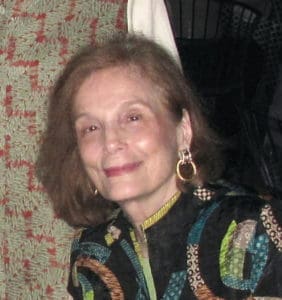An International Development Outlook. Board Spotlight: Judith Gilmore
An Internationalist
Growing up in Maine, Judy recalls having a strong interest in international relations and a lack of diversity in her community. However, when she entered university as a French and Spanish Literature major at Wellesley College, she began to look outward. Judy originally aspired to be an interpreter, having passed the UN translation and interpretation exam in both languages. Still hoping to improve her Spanish fluency, she embarked on a 4-month economics program in Cali, Colombia. “It was great exposure to a different culture and economy,” she highlights. Although not wanting to sound cliché, Judy remarks, “It’s true, just living in Colombia for 4 months, changed my life goals.” She describes the wide disparities she saw at the country club with her well-off friends while, at the same time, attending a university filled with revolutionaries. It was here that she decided to turn her life towards international development, retaining her deep interest in languages; and using them to assist developing countries.

Judy pursued her international development career initially in Geneva, at the International Labor Office, which is comprised of three parties: labor, employers, and government. From this experience, she began to notice how the interplay between these sectors not only required her technical expertise, but also mediation skills. Upon her return to Washington, DC, Judy worked for Oxfam-America, where she was able to appreciate the importance of the role of local organizations overseas. Judy subsequently joined USAID, where she specialized in evaluation and had major senior manager positions, including responsibility for the West Africa and East Asia regional offices.
Mediation in a Multi-Faceted Career
Within her career at USAID, Judy was always a spokesperson for a “bottom-up” approach. She supported the expansion of USAID’s work with non-governmental organizations by creating the first grants for NGO’s to provide institutional support and overhead expenses. Her commitment continued as she advocated for the role of civil society in all development programs, whatever the sector or region. She continued her commitment to involving local communities in the design and evaluation of projects. At first, Judy admitted that she did not know how conflict resolution skills would help with this task, “My focus was always on what is the project I was designing and how is this project working”. However, she quickly understood that in order to strengthen local organizations, she must not only understand the technical side but the collaborative and convening aspects.
Therefore in 2003, Judy took a facilitative mediation course at the Conflict Resolution Center of Montgomery County in Maryland. “I’m not sure I totally realized while I was there, how valuable conflict resolution skills could be, both professionally and personally”, but she quickly realized the power of peaceful dialogue and how to engage more effectively in cross-cultural communication. As a trained professional, Judy pursued a new career upon retirement from USAID as a mediator first at DC Superior Court’s Multi-Door, then expanding to multiple venues, such as the Human Rights and State’s Attorney’s Offices in Montgomery County and the federal government Shared Neutrals program.
“I come from a family of lawyers and judges,” Judy explains. Proud to follow this tradition, she often goes into the courtroom after her mediations to observe the cases. Some of her clients from foreign countries have difficulty dealing with the U.S. legal system. To Judy it was interesting to learn “how upset they were that someone from their same country could do that to them; could bring them to court, into a place that was incomprehensible, and how humiliating it was that they couldn’t resolve the dispute themselves and needed to rely on an outsider to assist them.” Judy’s mediation background allowed her to understand the softer side of court cases, expressing surprise that what some litigants were seeking “wasn’t money, but an apology.”
Local Organizations are Key
Judy’s involvement in MBBI started in 2009. She began as a Board member and then became the organization’s Secretary, and eventually the Vice-Chair. She is also co-chair of the Governance Committee. What brought Judy to MBBI was the membership. She explains that “the people at MBBI are so committed to what they do and just learning from their experience, and listening to them, has been so rewarding.”
During her time at MBBI, Judy led the creation of a consulting arm of the organization to take advantage of the scope and skills of members. She was also an active participant in the Projects Committee. She espoused the importance of design and monitoring projects to ensure their effectiveness. One of her activities was to compile data from all the projects to assess the overall impact and coherence with MBBI’s mandate. After analyzing all the projects, Judy found that “the one theme that carried across all projects was the importance of local organizations, building the capacity of these organizations; not coming in and doing it for them, but allowing them to be more confident in whatever they were doing.”
MBBI continues to function virtually with the devastation of Covid-19. Judy praises the Sierra Leone project as being a model of remote mediation, dating from the earlier Ebola epidemic in Africa. This project has strengthened women’s leadership roles, student participation in elections, and has contributed to peaceful national elections.
“Peacebuilding has Arrived”
Judy explains that the time for peacebuilding is now. “Donors are finally realizing its relevance as a way of resolving conflict; organizations are coalescing in partnerships and alliances to have more clout; and projects on the ground are increasingly innovative.” Judy shared her sentiment that “mediation is transformative in that it changes the way people look at themselves and the world around them. With experience, you gain agency and authenticity.”
She concludes, “For me, MBBI and mediation work is the logical sequence in the arc of my career development and interests”.
Article by Emily Shultis, MBBI Writer
